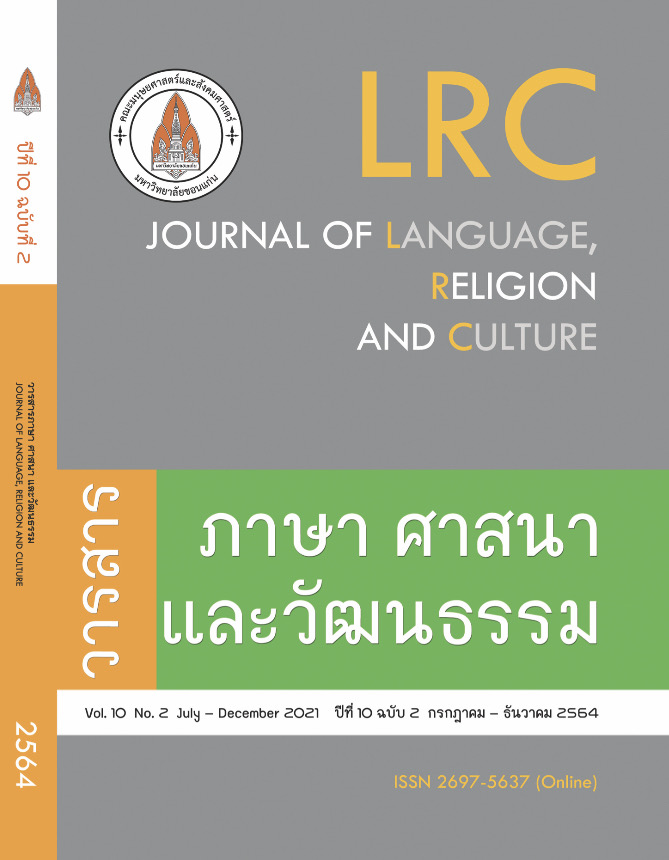คำแสดงทัศนะภาวะในตัวบทพระพุทธศาสนาที่เขียนเป็นภาษาอังกฤษ
คำแสดงทัศนะภาวะในตัวบทพระพุทธศาสนาที่เขียนเป็นภาษาอังกฤษ
คำสำคัญ:
คำแสดงทัศนะภาวะ, ตัวบทพระพุทธศาสนา, หลักคำสอนทางพระพุทธศาสนาบทคัดย่อ
การศึกษานี้ศึกษาเกี่ยวกับคำแสดงทัศนะภาวะในตัวบทพระพุทธศาสนาที่เขียนเป็นภาษาอังกฤษ การศึกษาคำแสดงทัศนะภาวะก่อนหน้านี้ให้ความสำคัญกับภาษาวิชาการ ดังนั้นการศึกษานี้จึงสำรวจคำแสดงทัศนะภาวะในตัวบทพระพุทธศาสนา คลังข้อมูลการศึกษาวิจัยเก็บรวบรวมมาจาก ตำราพระพุทธศาสนาที่เขียนเป็นภาษาอังกฤษ เป็นจำนวนทั้งสิ้น 150,000 คำซึ่งประกอบด้วย 181 ตัวอย่าง การวิเคราะห์ข้อมูลคำในตัวบทพระพุทธศาสนาวิเคราะห์จากคำปรากฎคำแสดงทัศนะภาวะ เช่น may might และ must ซึ่งคำแสดงทัศนะภาวะ ถูกจำแนกออกเป็นสามระดับ อันได้แก่ ระดับที่แน่นอน ระดับที่มีความน่าจะเป็นไปได้ปานกลาง และ ระดับที่อาจจะเป็นไปได้ การวิเคราะห์ข้อมูลผ่านการตรวจสอบความแม่นยำจากผู้เชี่ยวชาญทางด้านภาษาอังกฤษเป็นจำนวนสามท่าน ผลการศึกษาแสดงให้เห็นว่าคำแสดงทัศนะภาวะในตัวบทพระพุทธศาสนาในระดับที่อาจจะเป็นไปได้ปรากฎเป็นจำนวนสูงสุดที่ 72.37 เปอร์เช็นต์ การใช้ในความถี่ที่สูงของคำแสดงทัศนะภาวะในตัวบทพระพุทธศาสนาในระดับที่อาจจะเป็นไปได้สามารถอธิบายได้โดยการคาดคะเนถึงสถานการณ์ในอนาคต และ เหตุการณ์ที่ยังไม่สามารถพิสูจน์ได้ทางวิทยาศาสตร์ การศึกษานี้จะเป็นประโยชน์ต่อผู้สนใจในหลักคำสอนทางพระพุทธศาสนา ผู้เรียนภาษาอังกฤษเป็นภาษาต่างประเทศและผู้เรียนภาษาอังกฤษเป็นภาษาที่สอง
เอกสารอ้างอิง
Arrese, J. M. (2009). Effective vs. epistemic stance, and subjective/ intersubjectivity in
political discourse: A case study. Anastasio Tsangalidis & Roberta Facchinetti (eds.).
In Studies on English modality: In honour of Frank Palmer (pp. 24-52). Germany: Peter Lang.
Bishop, E. & Willis, K. (2014). Without hope everything would be doom and gloom:
Young people talk about the importance of hope in their lives, Journal of Youth
study. 17(6). 778-793.
Bonyadi, A. (2011). Linguistic manifestations of modality in newspaper editorials.
International Journal of Linguistics. 3(1). 1-13.
Chaney, J., & Martin, J. (2005). Intercultural business communication, UK: Pearson Education.
Chiluwa, I. M., & Anurada, S. (2020). Expressing (un)certainty through modal verbs in
advance fee fraud emails. Covenant Journal of Language Studies. 8(1). 17-34.
Gabrielatos, C., & McEnery, T. (2005). Epistemic modality in MA dissertation. Fuertes
Olivera, P.A. (ed.). In Lenguay Sociedad: Investigaciones recientes en lingüística aplicada. Lingüística y Filologí (pp. 311-331). Valladolid: Universidad de Valladolid.
Hacquard, V., & Wellwoodm, A. (2012). Embedding epistemic modals in English: A corpus-
based study. Semantics & Pragmatics, 5(4), 1-29.
Hofstede, G. (2009). Making sense of cross-cultural communication: The Hofstede
model of cultural dimensions. Retrieved from http://www.clearlycultural.com /geert-hofstede-cultural-dimensions/uncertainty-avoidance-index/ on January, 21, 2020
Hu, C., & Li, X. (2015). Epistemic modality in the argumentative essays of Chinese EFL
Learners, English Language Learning, 8(6), 20-31.
Hyland, K. (2005). Metadiscourse: Exploring interaction in writing. London: London
Continuum.
Landaw, J., Bodian, S., & Buhnemann, G. (2019). Buddhism for dummies. Canada: John
Wiley & Sons.
Ling, Z. (2015). Explicit grammar and implicit grammar teaching for English major students in
university. Sino US English Teaching, 12(8), 556-560.
Marin-Arrese, J. (2008). Commitment and subjectivity in the discourse of opinion columns
and leading article. a corpus study. Isabel Alonso Belmonte (ed.). In Different
Approaches to Newspaper Opinion Discourse (pp. 82-98). RAEL: revista electrónica de lingüística aplicada
McEnery, T., & Kifle, N. A. (2002). Epistemic modality in argumentative essays of second
language writers. Academic discourse, 182-195.
Martín, P. M. (2001). Epistemic modality in English and Spanish psychological texts. Revista
de Lenguas Para Fines Específicos, 8, 195-208.
Nhat, T., & Minh, N. (2019). Epistemic modality in TED talks on Education. VNU Journal of
Foreign Studies, 35(4), 75-91.
Nordlinger, R., & Traugott, E. C. (1997). Scope and the development of epistemic modality:
evidence from ought to. English Language and Linguistics, 1(2), 295-317.
O’Brien, T. (2006), Monk, Neighbor not at Peace. Heraldnet. Retrieved from
http://www.buddhistchannel.tv/index.php?id=65,3452,0,0,1,0 on January, 21, 2020.
Oh, S. Y. (2007). A corpus study of epistemic modality in Korean college students’ writing in
English. English Teaching, 62(2), 147-175.
Owen, B., Johnson, M., & Mitchell, T. (2013). Expressed humility in organizations:
implications for performance, Teams and Leadership. Organizational Science, 24(5),
-1538.
Panocová, R. (2008). Expression of modality in biomedical texts. Journal of Translation and
Interpretation, 1, 82-89.
Pasto, M. L. (2012). A contrastive analysis of epistemic modality in Scientific English.
Revista de Lenguas Para Fines Especificos, 18, 115-132.
Piqué, J. Posteguillo, S., & Andreu-Besó, J. V. (2001). A pragmatic analysis framework for
the description of modality usage in academic English contexts. ELIA, 2, 213-224.
Prebish, C. S., & Keown, D. (2010). Introducing Buddhism. USA: Routledge.
Rahman, A. M. A., & Rashid, R. A. (2017). Explicit and Implicit Grammar Instructions in Higher
Learning Institutions. English Language Teaching, 10(10), 92-101.
Sanders, J., & Spooren W. (1997). Perspective, subjectivity, and, modality from a cognitive
linguistic point of view. Wolf-Andreas Liebert, Gisela Redeker, and Linda Waugh
(eds.). In Discourse and Perspective in Cognitive Linguistics. Amsterdam/
Philadelphia: John Benjamins.
Servaes, J. (2000). Reflections on the Differences in Asia and European Values and
Communication Modes, Retrieved From http://home.scarlet.be/~tor- 3018/servaes_singapore.pdf on January, 21, 2020
Swan, M. (2016). Practical English Usage. Oxford: Oxford University Press.
Traugott, E. C. (2010). (Inter)subjectivity and Intersubjectification: a reassessment. In
Kristin Davidse, Lieven Vandelanotte & Hubert Cuyken (eds.). Subjectification,
intersubjectification and grammaticalization (pp. 29-73). Berlin & New York: Walter de Gruyter
Vold, E. T. (2006). Epistemic modality markers in research articles: A cross-linguistics and
cross-disciplinary study. International Journal Applied Linguistics, 16(1), 61-87.
Vukovic, M. (2014). Strong epistemic modality in parliamentary discourse. Open Linguistics.
, 37-52.
Ziegler, E. (2017). The relative merits of explicit and implicit learning of contrasted algebra
principles. Cross Mark Educational Psychology Review Journal, 30(2), 4.







